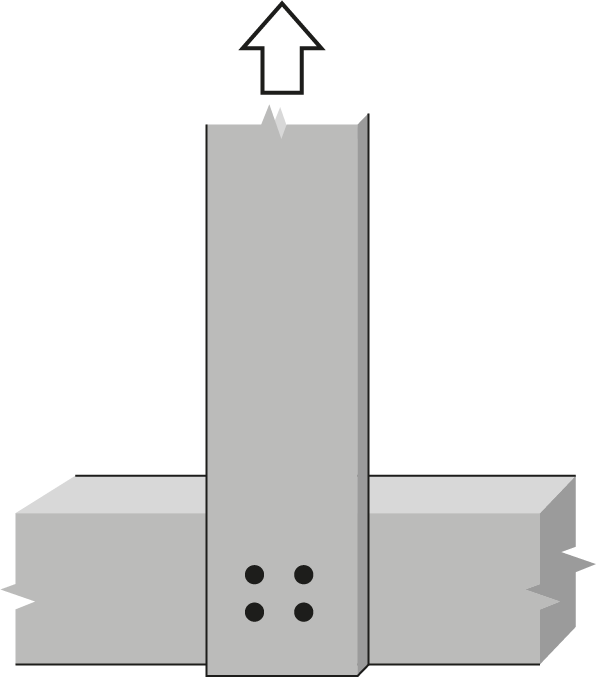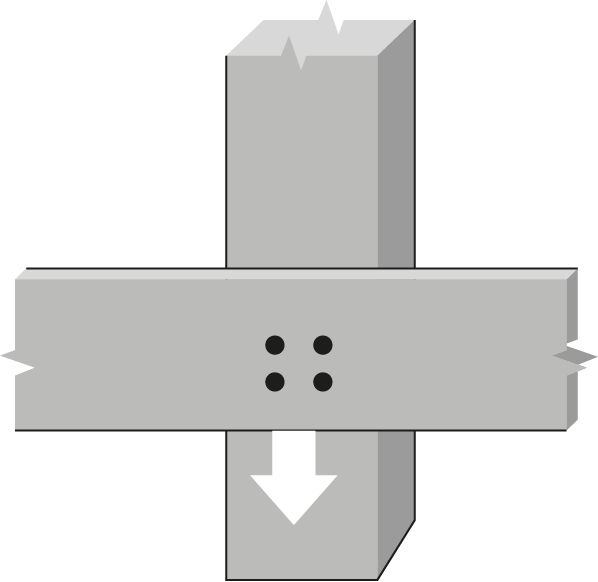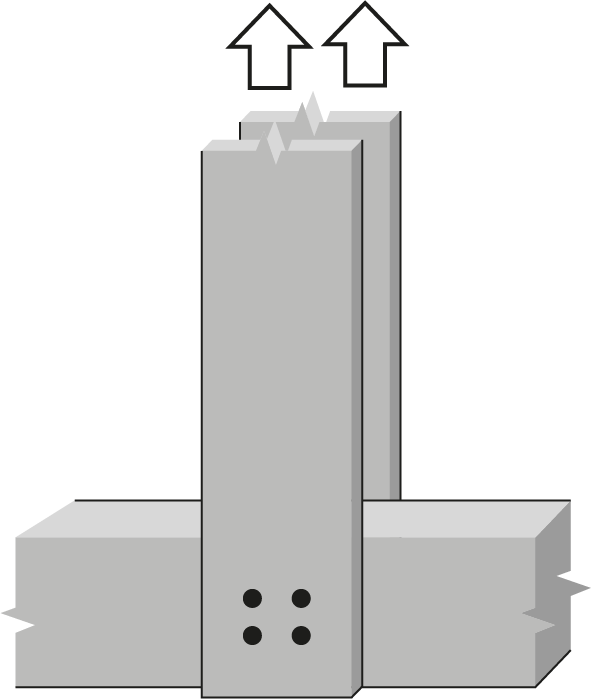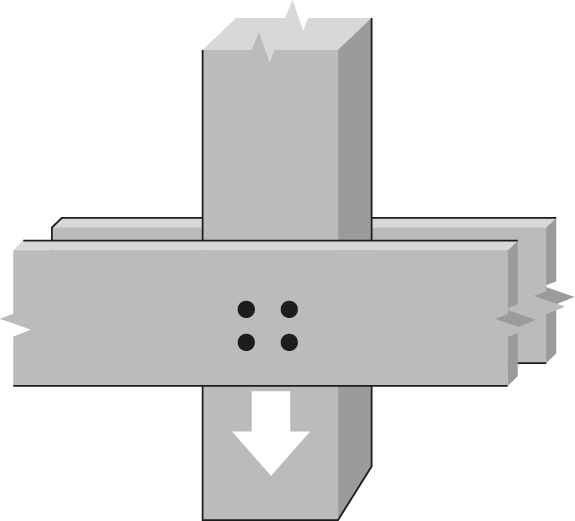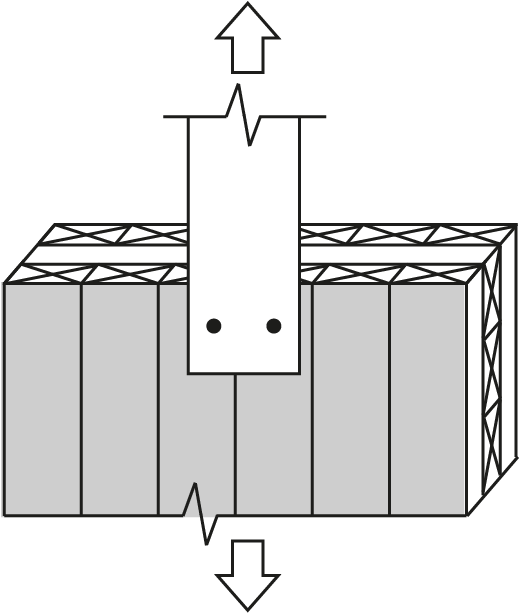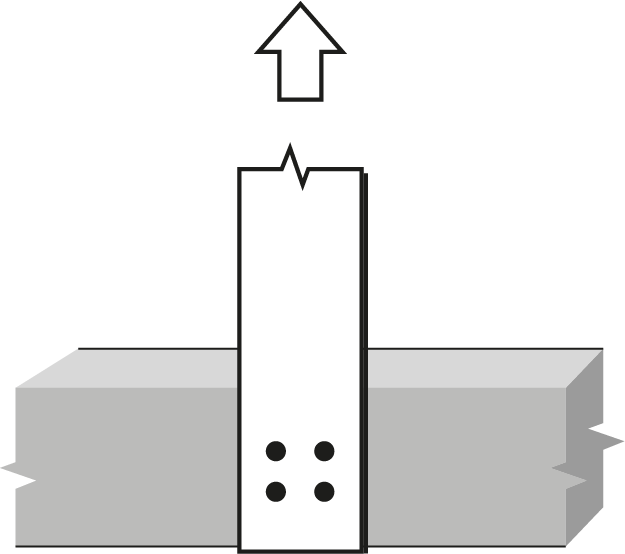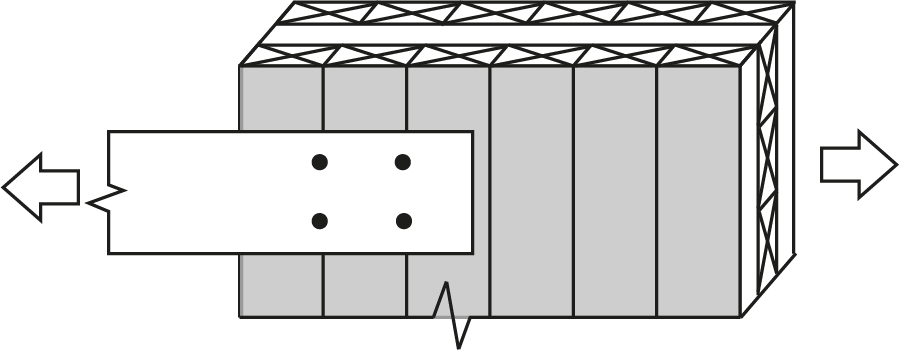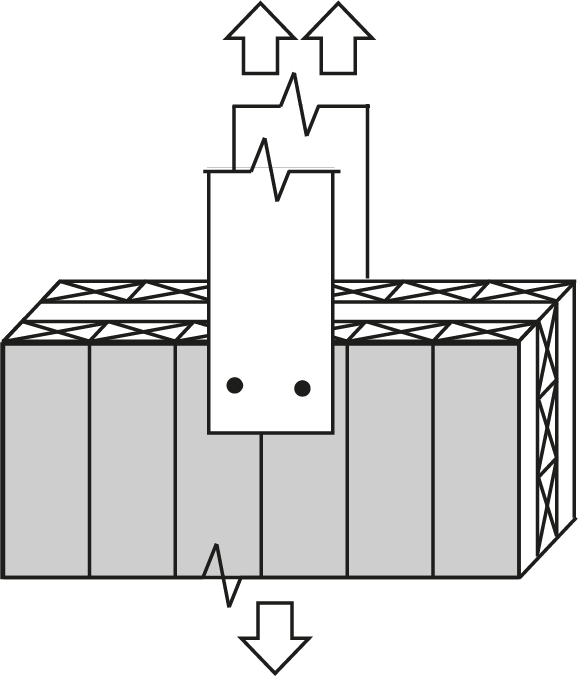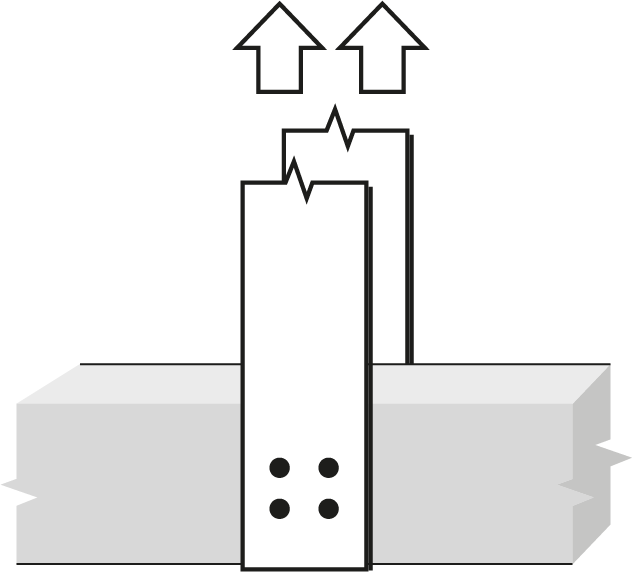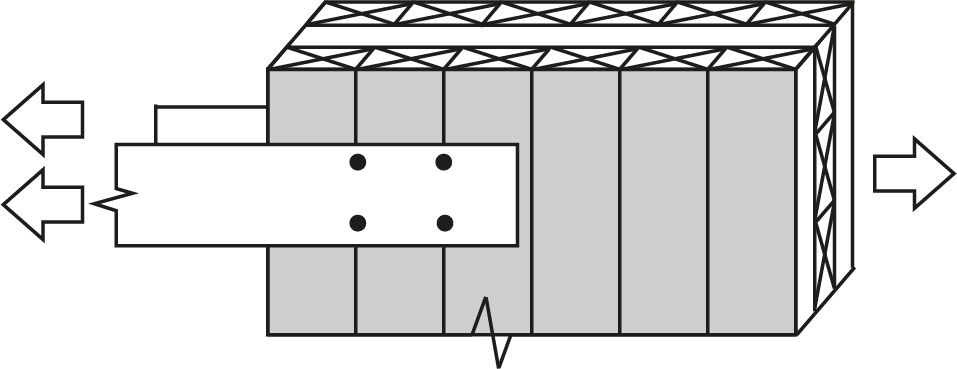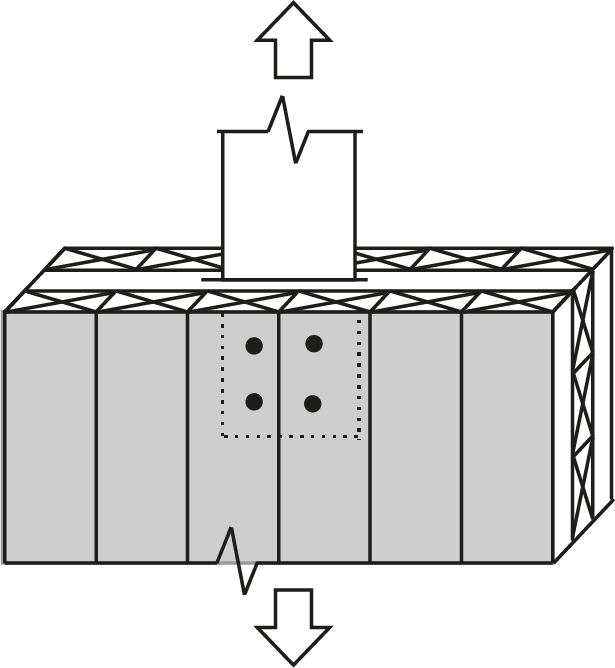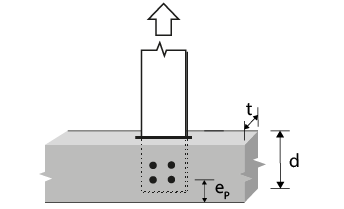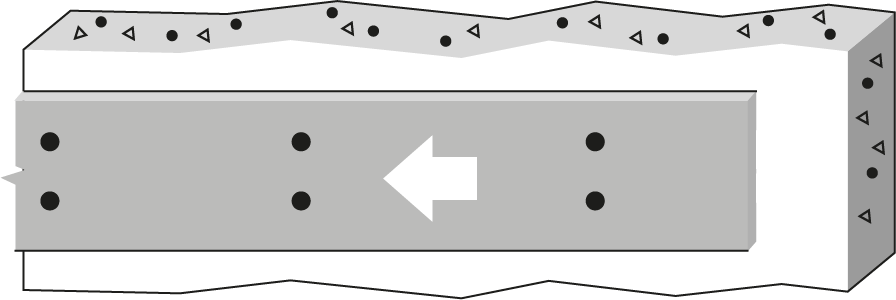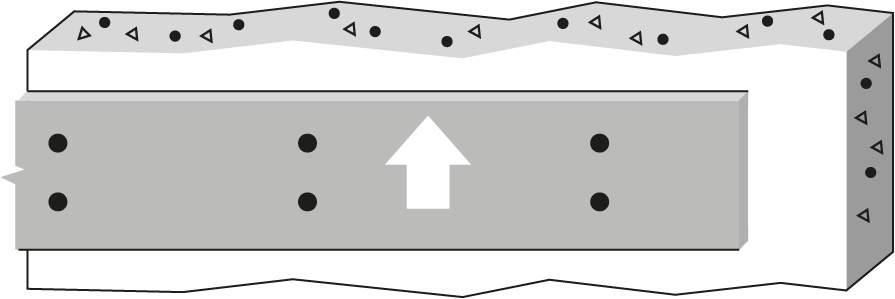 |
5/8″ Bolt or dowel Double Shear, D. Fir-L lumber to 6 mm steel plates |
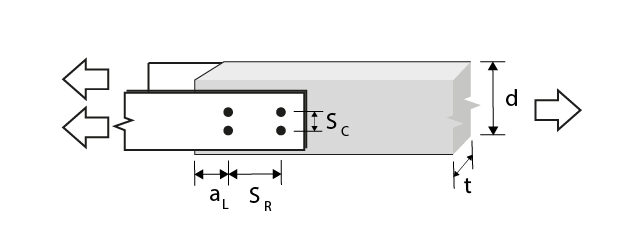 |
|||||||||||||
| Wood Member | Fastener |
 |
|||||||||||||
|
Thickness (mm) |
Depth (mm) |
No. of rows |
 |
No. of fasteners in a row | |||||||||||
| 2 | 3 | ||||||||||||||
| Bolt spacing in a row taken as the minimum of the loaded end distance3, aL, and the spacing between bolts in a row, SR (mm) | |||||||||||||||
| 64 | 95 | 127 | 159 | 190 | 64 | 95 | 127 | 159 | 190 | ||||||
| 38 | 89 | 1 | 0 | 7.70(R) | 11.6(R) | 15.4(R) | 19.3(R) | 19.9(c) | 11.6(R) | 17.3(R) | 21.2(T) | 21.2(T) | 21.2(T) | ||
| 38 | 184 | 2 | 47.625 | 12.3(G) | 16.1(G) | 20.0(G) | 23.8(G) | 27.7(G) | 16.1(G) | 21.9(G) | 27.7(G) | 33.5(G) | 35.3(T) | ||
| 38 | 184 | 2 | 79.375 | 15.4(R) | 21.0(G) | 24.9(G) | 28.7(G) | 32.6(G) | 21.0(G) | 26.8(G) | 32.6(G) | 35.3(T) | 35.3(T) | ||
| 38 | 235 | 2 | 111.125 | 15.4(R) | 23.1(R) | 29.8(G) | 33.6(G) | 37.5(G) | 23.1(R) | 31.7(G) | 37.5(G) | 43.3(G) | 43.5(T) | ||
| 38 | 235 | 3 | 47.625 | 16.9(G) | 20.7(G) | 24.6(G) | 28.4(G) | 32.3(G) | 20.7(G) | 26.5(G) | 32.3(G) | 38.1(G) | 39.6(T) | ||
| 38 | 235 | 3 | 62.5 | 21.5(G) | 25.3(G) | 29.2(G) | 33.0(G) | 36.9(G) | 25.3(G) | 31.1(G) | 36.9(G) | 39.6(T) | 39.6(T) | ||
| 89 | 89 | 1 | 0 | 18.0(R) | 27.1(R) | 36.1(R) | 45.1(R) | 46.6(c) | 27.1(R) | 40.6(R) | 49.6(T) | 49.6(T) | 49.6(T) | ||
| 89 | 184 | 2 | 47.625 | 28.8(G) | 37.8(G) | 46.8(G) | 55.8(G) | 64.9(G) | 37.8(G) | 51.3(G) | 64.9(G) | 78.4(G) | 82.6(T) | ||
| 89 | 184 | 2 | 79.375 | 36.1(R) | 49.3(G) | 58.3(G) | 67.3(G) | 76.3(G) | 49.3(G) | 62.8(G) | 76.3(G) | 82.6(T) | 82.6(T) | ||
| 89 | 235 | 2 | 111.125 | 36.1(R) | 54.1(R) | 69.8(G) | 78.8(G) | 87.8(G) | 54.1(R) | 74.3(G) | 87.8(G) | 101(G) | 102(T) | ||
| 89 | 235 | 3 | 47.625 | 39.5(G) | 48.6(G) | 57.6(G) | 66.6(G) | 75.6(G) | 48.6(G) | 62.1(G) | 75.6(G) | 89.1(G) | 92.7(T) | ||
| 89 | 235 | 3 | 62.5 | 50.3(G) | 59.3(G) | 68.3(G) | 77.3(G) | 86.4(G) | 59.3(G) | 72.8(G) | 86.4(G) | 92.7(T) | 92.7(T) | ||
| 140 | 140 | 1 | 0 | 22.4(R) | 33.6(R) | 44.8(R) | 52.2(g) | 52.2(g) | 33.6(R) | 50.4(R) | 67.2(R) | 76.0(T) | 76.0(T) | ||
| 140 | 191 | 2 | 47.625 | 33.5(G) | 44.7(G) | 55.9(G) | 67.1(G) | 78.3(G) | 44.7(G) | 61.5(G) | 78.3(G) | 89.2(T) | 89.2(T) | ||
| 140 | 191 | 2 | 79.375 | 44.8(R) | 56.5(G) | 67.7(G) | 78.9(G) | 89.2(T) | 56.5(G) | 73.3(G) | 89.2(T) | 89.2(T) | 89.2(T) | ||
| 140 | 241 | 2 | 111.125 | 44.8(R) | 63.8(G) | 75.0(G) | 86.2(G) | 93.9(T) | 63.8(G) | 80.6(G) | 93.9(T) | 93.9(T) | 93.9(T) | ||
| 140 | 241 | 3 | 47.625 | 41.6(G) | 52.8(G) | 64.0(G) | 75.2(G) | 85.7(T) | 52.8(G) | 69.6(G) | 85.7(T) | 85.7(T) | 85.7(T) | ||
| 140 | 241 | 3 | 62.5 | 51.3(G) | 62.5(G) | 73.7(G) | 84.9(G) | 85.7(T) | 62.5(G) | 79.3(G) | 85.7(T) | 85.7(T) | 85.7(T) | ||
| 191 | 140 | 1 | 0 | 30.6(R) | 45.8(R) | 52.2(g) | 52.2(g) | 52.2(g) | 45.8(R) | 68.8(R) | 78.3(g) | 78.3(g) | 78.3(g) | ||
| 191 | 191 | 2 | 47.625 | 45.7(G) | 61.0(G) | 76.2(G) | 91.5(G) | 104(g) | 61.0(G) | 83.9(G) | 107(G) | 122(T) | 122(T) | ||
| 191 | 191 | 2 | 79.375 | 61.1(R) | 77.1(G) | 92.4(G) | 104(g) | 104(g) | 77.1(G) | 100(G) | 122(T) | 122(T) | 122(T) | ||
| 191 | 241 | 2 | 111.125 | 61.1(R) | 91.7(R) | 104(g) | 104(g) | 104(g) | 91.7(R) | 116(G) | 139(G) | 147(T) | 147(T) | ||
| 191 | 241 | 3 | 47.625 | 60.8(G) | 76.1(G) | 91.4(G) | 107(G) | 122(G) | 76.1(G) | 99.0(G) | 122(G) | 135(T) | 135(T) | ||
| 191 | 241 | 3 | 62.5 | 75.9(G) | 91.2(G) | 106(G) | 122(G) | 135(T) | 91.2(G) | 114(G) | 135(T) | 135(T) | 135(T) | ||
| 241 | 140 | 1 | 0 | 38.6(R) | 52.2(g) | 52.2(g) | 52.2(g) | 52.2(g) | 57.8(R) | 78.3(g) | 78.3(g) | 78.3(g) | 78.3(g) | ||
| 241 | 191 | 2 | 47.625 | 57.6(G) | 76.9(G) | 96.2(G) | 104(g) | 104(g) | 76.9(G) | 106(G) | 135(G) | 141(T) | 141(T) | ||
| 241 | 191 | 2 | 79.375 | 77.1(R) | 97.3(G) | 104(g) | 104(g) | 104(g) | 97.3(G) | 126(G) | 141(T) | 141(T) | 141(T) | ||
| 241 | 241 | 2 | 111.125 | 77.1(R) | 104(g) | 104(g) | 104(g) | 104(g) | 116(R) | 147(G) | 157(g) | 157(g) | 157(g) | ||
| 241 | 241 | 3 | 47.625 | 76.7(G) | 96.0(G) | 115(G) | 135(G) | 154(G) | 96.0(G) | 125(G) | 154(G) | 170(T) | 170(T) | ||
| 241 | 241 | 3 | 62.5 | 95.8(G) | 115(G) | 134(G) | 154(G) | 157(g) | 115(G) | 144(G) | 170(T) | 170(T) | 170(T) | ||
| 292 | 140 | 1 | 0 | 46.7(R) | 52.2(g) | 52.2(g) | 52.2(g) | 52.2(g) | 70.1(R) | 78.3(g) | 78.3(g) | 78.3(g) | 78.3(g) | ||
| 292 | 191 | 2 | 47.625 | 66.8(G) | 90.2(G) | 104(g) | 104(g) | 104(g) | 90.2(G) | 125(G) | 135(T) | 135(T) | 135(T) | ||
| 292 | 191 | 2 | 79.375 | 88.2(G) | 104(g) | 104(g) | 104(g) | 104(g) | 112(G) | 135(T) | 135(T) | 135(T) | 135(T) | ||
| 292 | 241 | 2 | 111.125 | 93.5(R) | 104(g) | 104(g) | 104(g) | 104(g) | 140(R) | 157(g) | 157(g) | 157(g) | 157(g) | ||
| 292 | 241 | 3 | 47.625 | 92.9(G) | 116(G) | 140(G) | 157(g) | 157(g) | 116(G) | 151(G) | 186(G) | 187(T) | 187(T) | ||
| 292 | 241 | 3 | 62.5 | 116(G) | 139(G) | 157(g) | 157(g) | 157(g) | 139(G) | 174(G) | 187(T) | 187(T) | 187(T) | ||
|
Notes:
|
. | ||||||||||||||

